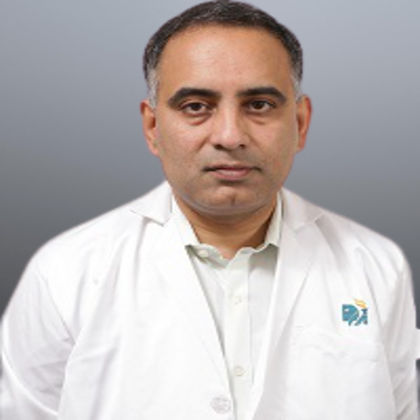Understanding Basal Cell Carcinoma: A Comprehensive Guide
Explore our comprehensive guide on Basal Cell Carcinoma (BCC), covering causes, symptoms, diagnosis, treatment options, and prevention tips to help you stay informed and proactive.

Written by Dr.Sonia Bhatt
Last updated on 3rd Jul, 2025
.webp)
Basal cell carcinoma (BCC) is the most common type of skin cancer among all skin cancer cases. It originates in the basal cells, which are found in the outermost layer of the skin (epidermis). These cells are responsible for producing new skin cells as old ones die off. BCC is primarily caused by long-term exposure to ultraviolet (UV) radiation from sunlight or tanning beds. While BCC is generally slow-growing and rarely metastasises, it can cause significant damage to surrounding tissues if left untreated. This article provides a comprehensive overview of basal cell carcinoma, including its causes, risk factors, symptoms, diagnosis, treatment, and prevention.
Causes and Risk Factors
The primary cause of basal cell carcinoma is prolonged exposure to ultraviolet (UV) radiation from the sun or tanning beds. UV radiation damages the DNA in skin cells, leading to mutations that can result in cancer. Several risk factors increase the likelihood of developing BCC:
Fair Skin: Individuals with fair skin, light hair, and light eyes are at higher risk because they have less melanin, which provides some protection against UV radiation.
Age: The risk of BCC increases with age, as cumulative sun exposure over the years contributes to the development of skin cancer.
History of Sunburns: Severe sunburns, especially during childhood, significantly increase the risk of BCC.
Excessive Sun Exposure: Spending long hours in the sun without protection increases the risk of BCC.
Tanning Beds: The use of tanning beds exposes the skin to harmful UV radiation, increasing the risk of BCC.
Family History: A family history of skin cancer can increase the risk of developing BCC.
Radiation Therapy: Previous radiation therapy treatments can increase the risk of BCC in the treated areas.
Immune Suppression: Individuals with weakened immune systems, such as organ transplant recipients or those with HIV/AIDS, are at higher risk of developing BCC.
Symptoms of Basal Cell Carcinoma
Basal cell carcinoma can present in various forms, and its appearance can vary depending on the individual. Common symptoms of BCC include:
A Pearly White, Skin-Colored, or Pink Bump: Often appears on sun-exposed areas such as the face, ears, and neck. On fair skin, it may look translucent, while on darker skin, it can appear brown or glossy black.
A Brown, Black, or Blue Lesion: May have dark spots and a slightly raised, translucent border.
A Flat, Scaly, Reddish Patch: Often found on the trunk, arms, or legs. These patches can grow larger over time and may be mistaken for eczema or psoriasis.
A White, Waxy, Scar-Like Lesion: Typically without a clearly defined border, often found on the face. This type of BCC can be mistaken for a scar.
A Persistent, Non-Healing Sore: A sore that bleeds, oozes, or crusts and does not heal within a few weeks.
Diagnosis of Basal Cell Carcinoma
Diagnosing basal cell carcinoma involves a combination of medical history, physical examination, and diagnostic tests. The following steps are typically taken to diagnose BCC:
Medical History and Physical Examination: The healthcare provider will take a detailed medical history and perform a thorough physical examination of the skin, paying close attention to any suspicious lesions.
Dermatoscopy: A dermatoscope is a handheld device that magnifies the skin and allows the healthcare provider to examine the lesion more closely.
Skin Biopsy: If a lesion appears suspicious, a skin biopsy will be performed. This involves removing a small sample of the lesion and examining it under a microscope to confirm the diagnosis of BCC.
Treatment of Basal Cell Carcinoma
The treatment of basal cell carcinoma depends on the size, location, and type of the tumour, as well as the patient's overall health. Common treatment options for BCC include:
Surgical Excision: The most common treatment for BCC involves surgically removing the tumour along with a margin of healthy tissue. This ensures that all cancerous cells are removed.
Mohs Surgery: A specialised surgical technique used for larger, recurrent, or high-risk BCCs. The surgeon removes the tumour layer by layer, examining each layer under a microscope until no cancerous cells remain. This technique preserves as much healthy tissue as possible.
Curettage and Electrodessication: This procedure involves scraping away the tumour with a curette (a sharp, spoon-shaped instrument) and then using an electric needle to destroy any remaining cancerous cells. It is typically used for small, superficial BCCs.
Cryotherapy: This treatment involves freezing the tumour with liquid nitrogen to destroy cancerous cells. It is often used for small, superficial BCCs.
Topical Treatments: Certain topical medications, such as imiquimod or 5-fluorouracil, can be applied directly to the skin to treat superficial BCCs.
Radiation Therapy: Radiation therapy may be used for BCCs that are difficult to treat surgically or for patients who are not candidates for surgery. It involves using high-energy beams to target and destroy cancerous cells.
Photodynamic Therapy (PDT): This treatment involves applying a photosensitising agent to the skin and then exposing it to a specific wavelength of light to destroy cancerous cells. It is often used for superficial BCCs.
Prevention of Basal Cell Carcinoma
Preventing basal cell carcinoma involves protecting the skin from harmful UV radiation. Here are some key preventive measures:
Sunscreen: Apply a broad-spectrum sunscreen with a high SPF (30 or higher) to all exposed skin, even on cloudy days. Reapply every two hours and after swimming or sweating.
Seek Shade: Avoid direct sun exposure, especially between 10 a.m. and 2 p.m., when the sun's rays are the strongest.
Protective Clothing: Wear wide-brimmed hats, sunglasses, and long-sleeved clothing to shield your skin from the sun.
Avoid Tanning Beds: Refrain from using tanning beds, as they emit harmful UV radiation that increases the risk of skin cancer.
Regular Skin Checks: Perform regular self-examinations of your skin to check for any new or changing lesions. Schedule annual skin exams with a dermatologist for a professional evaluation.
Living with Basal Cell Carcinoma
Living with basal cell carcinoma can be challenging, but with proper treatment and preventive measures, individuals can manage the condition effectively. Here are some tips for living with BCC:
Follow-Up Care: Regular follow-up appointments with your healthcare provider are essential to monitor for any recurrence or new lesions.
Sun Protection: Continue to practice sun protection measures to reduce the risk of developing additional skin cancers.
Healthy Lifestyle: Maintain a healthy lifestyle with a balanced diet, regular exercise, and adequate hydration to support overall skin health.
Emotional Support: Living with a cancer diagnosis can be emotionally challenging. Seek support from friends, family, or support groups to help cope with the emotional aspects of the condition.
Conclusion
Basal cell carcinoma is the most common type of skin cancer, primarily caused by prolonged exposure to ultraviolet (UV) radiation. While BCC is generally slow-growing and rarely metastasises, it can cause significant damage to surrounding tissues if left untreated. Recognising the symptoms of BCC and seeking prompt medical attention is crucial for early diagnosis and effective treatment. By practising sun protection measures and performing regular skin checks, individuals can reduce their risk of developing basal cell carcinoma and other skin cancers. If you notice any unusual changes in your skin, such as new growths or sores that do not heal, it is important to consult a healthcare provider for proper evaluation and management.
Consult Top Oncologists
Consult Top Oncologists

Dr. Tarun Jindal
Uro Oncologist
14 Years • MS (AIIMS, New Delhi), MCh (Gold Medalist), Fellow, VUI, Henry Ford Hospital, Detroit, USA; Robotic and Laparoscopic surgeon
Kolkata
Apollo Multispeciality Hospitals , Kolkata, Kolkata
(100+ Patients)

Dr. Sandeep Muzumder
Radiation Specialist Oncologist
21 Years • MBBS (JIPMER, Pondicherry), MD (AIIMS, New Delhi)
Bhubaneswar
Apollo Hospitals Old Sainik School Road, Bhubaneswar

Dr Nikhil Suresh Ghadyalpatil
Oncologist
18 Years • MBBS, MD (G. Med), DNB (G.Med), MNAMS DM (Medical Oncology - Tata Memorial Hospital) European Certification In Medical Oncology (ECMO) MRCP (Med Onco SCE), PDCR
Hyderabad
Apollo Hospitals Jubilee Hills, Hyderabad

Dr. Raja T
Oncologist
20 Years • MBBS; MD; DM
Chennai
Apollo Hospitals Greams Road, Chennai
(150+ Patients)

Dr Harshit Srivastava
Oncologist
6 Years • MS (General Surgery) , MCh (Surgical Oncology)
Lucknow
Apollomedics Super Speciality Hospital, Lucknow